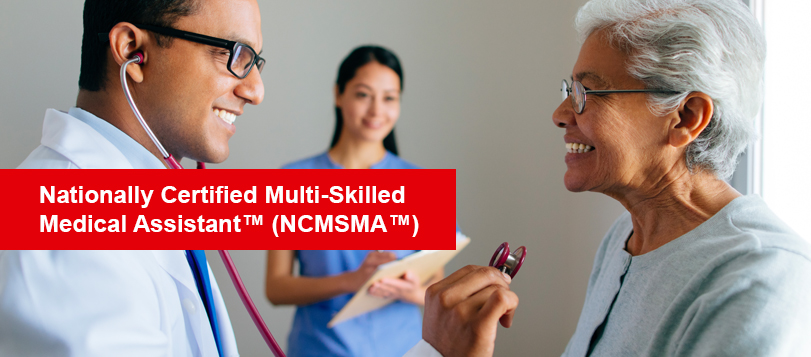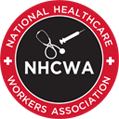
Certified Medical Assistants are integral members of the healthcare team. They assist with patient care management and the day-to-day functioning of a practice, hospital or other medical facility, under the supervision of a licensed healthcare provider.
What Does it Mean to be a Certified Multi-Skilled Medical Assistant?
By definition, a certified multi-skilled medical assistant ™(CMSMA™) nationally certified multi-skilled medical assistant ™(NCMSMA™) registered multi-skilled medical assistant ™(RMSMA™) is any medical assistant that has received and has met the certification requirements set by the National Healthcare Workers Association®(NHCWA®). A Certified Multi-Skilled Medical Assistant can perform a variety of clinical procedures as well as administrative duties. Clinical tasks performed by multi-skilled medical assistants can vary according to the laws in each state.
There are three types of medical assistants: Administrative, Clerical and Clinical.
Administrative and Clerical Medical Assistants are often interlinked. They require medical knowledge, organization and business skills to perform administrative duties such as:
- Scheduling appointments
- Composing or transcribing dictated letters
- Completing and submitting insurance forms
- Sorting/handling mail
- Accounts payable and receivable
Clinical Medical Assistants, on the other hand, in addition to carrying out administrative procedures, can perform clinical duties such as measuring vital signs and performing EKGs. They can also draw blood and other samples, administer injections, maintain treatment rooms, sterilize instruments, and assist during physical examinations.
Where Does a Medical Assistant Work?
Medical Assistants who have graduated from an accredited Medical Assisting program can work in a variety of healthcare settings – from physician practices, nursing homes and clinics to outpatient surgery centers and hospitals. Medical Assistants perform basic tasks, both clinical and administrative, to relieve some of the burden off of doctors.
As the demand for Medical Assistants increases, more and more facilities are requiring certification in order to reduce the impact of liability. Accredited Medical Assisting programs are offered in postsecondary vocational schools, junior colleges and many colleges and universities. Postsecondary programs usually last a year or less and result in a certificate or diploma. Meanwhile, those who complete a two-year program can earn an associate degree.
The Importance of Certification
NHCWA Certification allows healthcare workers and employers to validate their knowledge and abilities and the mastery of industry-specific skills. Achieving certification helps healthcare organizations demonstrate that their business is run effectively by qualified staff. Meanwhile, recertification reflects a commitment to ongoing learning and improvements. Additionally, organizations that are NHCWA certified can successfully demonstrate to patients, employees and other companies that they use industry-respected best practices.
NHCWA Certification Benefits Patients and Families: NHCWA Certification provides validation that a medical organization and its employees have demonstrated the necessary knowledge and skills to meet the complex requirements of the healthcare industry. This ensures high quality care delivery, which can give patients and families peace of mind.
NHCWA Certification Benefits Healthcare Professionals: In order to become certified, healthcare professionals must validate their industry-specific knowledge and skills. Passing the certification process allows them to position themselves for appropriate recognition, and it can give them a critical sense of confidence and achievement.
NHCWA Certification Benefits Employers: Certification is a vehicle for hospitals to distinguish themselves from competitors. It demonstrates to consumers that the organization attracts only the most skilled and experienced healthcare workers. Achieving NHCWA certification (and meeting the continuing education requirements necessary to maintain it) also contributes to an environment of professionalism and a culture of employee retention. This is especially critical given the severe shortage of qualified healthcare workers.
NHCWA Medical Assistant Certification Requirements:
One of these requirements must be met:
- Graduation from an allied health vocational training program
- One year of work experience in the field
- Military experience/training in the field
- Reciprocity from another certifying agency
NHCWA Certification Requirements for Medical Assistant Certification:
The following skills requirements are mandatory and must be met for NHCWA certification: The NHCWA requires CPR certification for all medical professionals applying for NHCWA certification.
- Current CPR certification
- A minimum of 25 successful venipuncture’s
- A Minimum of 10 successful Skin puncture’s
- A Minimum of 10 EKG Test Strips
(In addition check your states requirements for minimum EKG strips & venipuncture Sticks some states require an average of 15 EKG Test Strips and 30 venipuncture Sticks)
